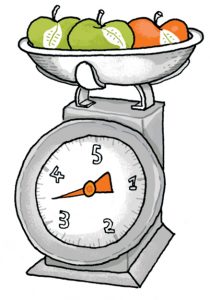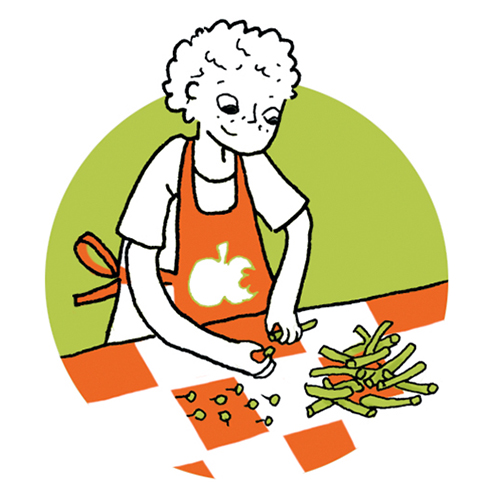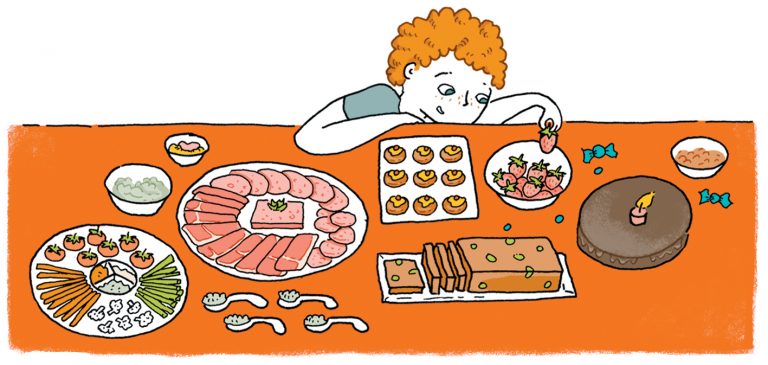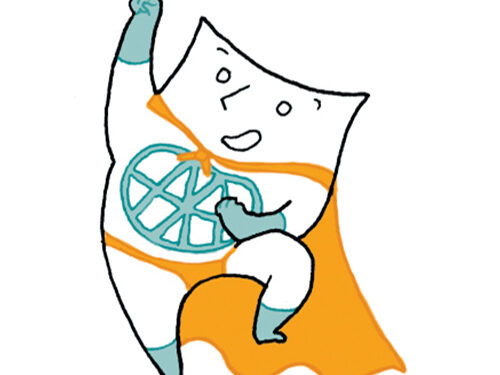Your dietary plan
For a newborn baby
It is possible to have your child looked after, provided that you explain the diet and its importance to the people who are going to look after him. If you opt for this solution, it is preferable to use a nanny who comes to your home or who has only a few children to look after, so as to limit possible infections that could lead to “decompensation”.
It is essential that the person(s) looking after your child is/are fully available and supportive, and that they trust you. In the beginning, before diversification, you will usually prepare the bottles for the day yourself. Make it clear that it is important that your child takes his or her own bottles and only his or her own. You can also suggest that the childminder who looks after your child accompany you to a few visits so that she can learn about your baby’s strict diet and treatment from the start. This will allow her to assess whether or not she can take on this responsibility.
Your baby may be at risk of decompensation, with a rise in blood levels if there is a mistake with the bottle or if he or she is not eating enough, the nurse should be aware of these situations and should be able to contact you without difficulty in case of hesitation.
For a small child
Diversification begins at around 4-6 months of age, just like any other child. Fruits and vegetables will be introduced at the same age, in the same quantities, but the leucine intake they represent will be accounted for by you, respecting the total daily quantity prescribed.
As with any child, introduce 1 new food at a time, every 2-3 days (a new vegetable or fruit).
If your child likes to be spoon-fed, he or she may no longer want the whole amino acidAmino acids are molecules that combine to form proteins. 20 amino acids make up the proteins of the human body. Of these, 8 are essential (our body cannot synthesise them, they must be supplied by the diet): isoleucine, leucine, lysine, methionine, phenylalanine, threonine, tryptophan, valine.
Arginine and histidine are semi-indispensable. In fact, only infants need to take them from their food.
Cysteine, glycine and tyrosine may be indispensable for certain populations mixture in the bottle. However, the prescribed amounts should be taken in full, every day. This does not mean that you have to “force” the child to take the whole amount.
Ask your dietician if it is possible to offer it in a more concentrated form or in another form: in a porridge, in fruit, etc. or by changing the mix of amino acids.
If your child is being looked after, explain to the carer:
- that he is entitled to vegetables, potatoes and fruit, but in certain quantities. You may be able to provide the meals yourself;
- that he must take his amino acidAmino acids are molecules that combine to form proteins. 20 amino acids make up the proteins of the human body. Of these, 8 are essential (our body cannot synthesise them, they must be supplied by the diet): isoleucine, leucine, lysine, methionine, phenylalanine, threonine, tryptophan, valine.
Arginine and histidine are semi-indispensable. In fact, only infants need to take them from their food.
Cysteine, glycine and tyrosine may be indispensable for certain populations mixture, all of it, every day.
Then you can teach them, if you trust them, the equivalence system or plan the menus with them and they will carry them out. Give a list of forbidden foods so that they are not introduced to your child and explain why.
Pilfering and/or major diet errors inevitably lead to increased blood levels. Education of those around you is essential !

Food education
Also give a supply of cupcakes or low protein foods so that your child can ‘make up’ for what cannot be given, especially if another child is being looked after at the same time as yours.
Children are very curious, and it is important to stimulate their curiosity about food. Take advantage of the fact that they want to become independent to encourage them and talk to them about their particular diet.
If you do the shopping, do it with your child, and let him/her choose the fruits and vegetables by name and orient him/her in the variety.
Fruit and vegetables (including potatoes) are and will be the basis of his diet. The sooner he tries different tastes, textures and colours, the sooner he will accept different dishes and the easier and more accepted the diet will be.
If you are in the supermarket, and there is a promotion on sausage, pâté, or other forbidden foods, explain to him that he cannot eat them but give him an opening on another food (fruit paste, sour candy or small fruit…).

Meals are very important moments in the social development of the child. Whenever possible, they should be taken with the family and/or in the community.
Design meals for your child that are as close as possible to those of the rest of the family or to those provided by the childminder for the other child(ren) in her care.
The family is a help: if there are older brothers or sisters, he will learn how to eat by watching them. Siblings can encourage him.
If there are no siblings, eat with him; do not tell yourself that when he eats alone, well supervised, you apply the diet better. When he starts to use the spoon on his own, let him be clumsy, drop a few pieces of food around the plate, don’t overprotect him, he may have “tantrums” and even tantrums, just by reaction.
He may refuse to eat or he may steal to ‘test’ you, which is normal, as he knows that food is a way to get your attention. You need to put up barriers, as you would with any other child.

It is about educating them. The earlier a child is educated, the more the diet will be accepted and followed.
Get him INVOLVED in the kitchen whenever he can. If he is involved, he will be interested and want to try new foods. Play with textures, smells and colours. Get him to make recipes as soon as he is able.
Vary the dishes as much as possible, which are all based on vegetables and/or fruit, to avoid boredom with this type of diet.
Use spices, sauces based on vegetable broth, white wine, chicken juice, which will flavour the dishes differently. You can have a cupboard, at her height, with authorised foods so that there are not only prohibitions and therefore risks of “pilfering”. You can include in the menus, dishes that the whole family can eat, by evaluating the number of parts that this represents.
In the community, at school
If you cannot have your child eat at home, after having drawn up an Individualised Reception Plan (PAI), bring his “packed lunch”, if possible as close as possible to the canteen menu, as this is a time of “temptations”. Pass on the instruction that he must be confronted with others and that he must not eat in isolation (with supervision, of course).
If there are birthdays, workshops… offer to provide the ingredients and/or cake so that your child can share with the other children; your child’s food is in no way ‘bad’ for the others; and it will make them feel less ‘different’.
If there are family parties (with a buffet), don’t exclude him, guide him so that he can choose the food he is entitled to from the buffet: raw vegetables, fruit, sorbets, sweets, etc. He will gradually get into the habit of asking you whether or not he can eat a particular food and will thus become more responsible.





